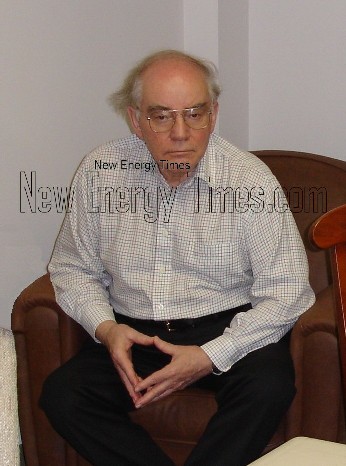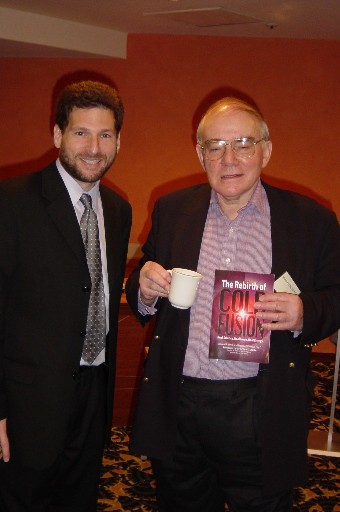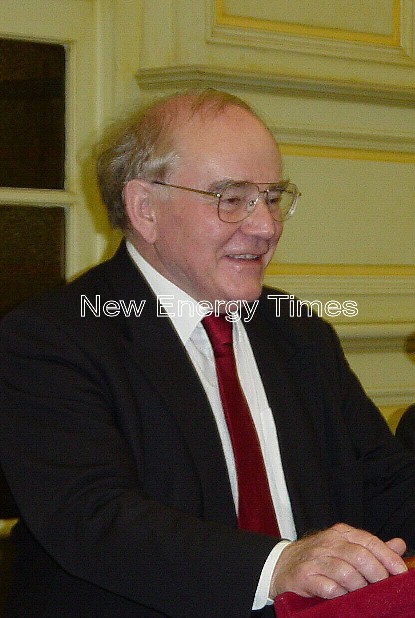Fleischmann Dead at 85: End of an Era
Aug. 4, 2012 – By Steven B. Krivit –
Martin Fleischmann, co-discoverer with B. Stanley Pons of a phenomenon they initially attributed to nuclear fusion, is dead at 85.

Martin Fleischmann, Edmonton, Canada, 2005 (Photo Credit: H. Rees)
Fleischmann died Aug. 3 at his home in Tisbury, U.K., in the presence of his family. He suffered from numerous health problems for many years, including Parkinson’s disease, diabetes and heart disease. He was bedridden for the last few months. He is survived by his wife, Sheila, son, Nicholas, daughter, Vanessa, and eight grandchildren. A third child, Charlotte, died several years ago.
Today, Nicholas told me, “Until the very end, my father remained stoic, as ever, not a word of any complaint.”
“He might shout and carry on about topics of science but not about himself,” Nicholas said. “It’s the end of an era.”
Fleischmann was regarded as one of the world’s top electrochemists. He was known for his driving passion for discovery and for breaking new ground, which other scientists then followed to great commercial success.
He was a Fellow of the Royal Society and by the age of 40 was named chair of the Electrochemistry Department at the University of Southampton. Fleischmann won the Royal Society of Chemistry’s medal for Electrochemistry and Thermodynamics in 1979. He was president of the International Society of Electrochemistry (1970-1972). In 1985, he was awarded the Palladium Medal by the U.S. Electrochemical Society.
When he and Pons claimed to discover a new, cheaper way to create controlled nuclear fusion energy in a test-tube on March 23, 1989, everything changed for him. The personal and scientific fallout from the announcement was a burden he bore for the rest of his life.
I met and interviewed Martin for the first time Aug. 24, 2003.
“Have you always been a heretic?” I asked.
“Oh, yes, I’ve always worked on the outside,” Fleischmann said. “Very frequently, my things have been taken over by other people and become mainstream – but not a thing of this magnitude.”
On Aug. 19, 2004, Fleischmann told me about his family background. He was born on March 29, 1927, in Czechoslovakia. His mother was a Roman Catholic.

Steven B. Krivit with Martin Fleischmann, ICCF-11, Marseilles, France, 2004 (Photo Credit: F. Gordon)
“There is a considerable mystery about my paternal grandfather,” Fleischmann wrote. “I have heard him described both as a Slovak and a Hungarian. There is no doubt that he came from Banska Štiavnica in Slovakia (or its environs) and that he was an orphan. He was adopted by a Jewish family called Fleischmann; his first name was Maximillian.”
The last time I spoke with Martin was June 3, 2009. He expressed his regret about calling his and Pons’ discovery “cold fusion.” He acknowledged for the first time that neutrons must be the key to understanding low-energy nuclear reactions, rather than the hypothesis of deuterons or protons somehow overcoming the extremely energetic Coulomb barrier at room temperature.
Here is a link to that interview and audio recording.
Thank you, Martin. It was an honor and a privilege to know you and learn about science from you.
Postscript: Fleischmann stayed involved in the field, to the best of his ability, to the end. He followed developments, went to conferences and openly discussed LENR science with many people.
Pons left the field in the late 1990s and elected to remain out of the public spotlight and unaffiliated with the field. For this reason, their followers during the past decade looked at Fleischmann as the inspirational leader. To my knowledge, Pons is well and living in the south of France teaching mathematics for chemistry.

Martin Fleischmann: March 29, 1927 – August 3, 2012
Photo Credit: Steven B. Krivit

